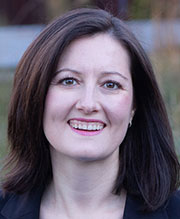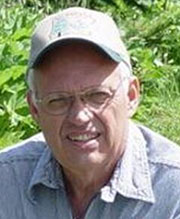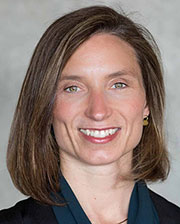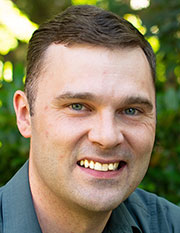Meet the candidates for our State Representative

by Shawna Muckle, CMN student intern
While the Coronavirus has upended most aspects of American life, Oregon’s statewide electoral primary remains scheduled for May 19, with voter’s pamphlets set to be delivered by mail from April 22-24. House District 33, Cedar Mill’s district in the Oregon House, has its first open seat since 2002, as incumbent Rep. Mitch Greenlick plans to retire after 2020.
Four Democrats have filed in the H.D. 33 Democratic primary: Andy Saultz, Maxine Dexter, Servin Bussell, and Christina Stephenson. Meanwhile, one Republican, Dick Courter, has filed in the H.D. 33 Republican primary, making him the presumptive nominee to run against the Democrat winner in the November’s general election. Read on for information about each H.D. 33 candidate and their goals for office:

Serin Bussell, Democrat, has spent the last eight years working for Oregon’s state government in various capacities, specializing in issues related to environmental preservation and campaign finance regulation. Most recently, she served as Chief of Staff for state Sen. Jeff Golden in the 2019 Oregon legislative session, and as campaign manager for state Sen. Charles Gallia’s campaign in Senate District 20. She has previously worked at the Oregon Department of Transportation, in private geological engineering consulting, and at Metro’s Parks and Nature Department.
Bussell emphasizes that her experience serving Oregon state agencies, as well as her experiences as a union member and a member of the Public Employee Retirement System (PERS), give her unique insight into the responsibilities of state-level officeholding compared to her opponents.
“I have the experience to know how hard public employees work, how important it is to fully fund government services, and how to be an effective legislator from day one, because I know how the building works and how not to succumb to the cultural pressures in the Capitol,” Bussell said.
Bussell plans to focus her tenure on campaign finance reform, affordable housing solutions, and climate change. She particularly frames campaign finance regulations, including public financing of elections and limits on corporate campaign contributions, as a means of promoting matters of racial and social justice, equity, and inclusion.
“We know that communities of color historically have not had the same access to intergenerational wealth or community wealth as white communities,” Bussell said. “If we vision a world where representative democracy actually exists and the people on school boards, at the city council level, at the state level, and beyond, reflect the racial, economic, and shared lived experiences with those they represent, then we need a world where these financial barriers don’t exist.”

Dick Courter, Republican, is a professional forest consultant and veteran who owns three small businesses, including GeneTechs, a professional forestry consulting business that specializes in advising family forest landowners.
Courter serves on several local boards and organizations dedicated to forestry and conservation, including as Vice Chair of the National Woodland Owners Association Board, and as Vice President of the Oregon Small Woodlands Association, in addition to a past chairmanship within the Oregon Association of Conservation Districts.
As the only Republican running for the H.D. 33 seat, a seat that has increasingly become a solid Democratic spot in the Oregon State Legislature, Courter says that he is running primarily for the sake of offering voters an alternative choice to the Democratic nominee in the general election.
Courter’s policy priorities for office include curtailing state taxes, especially taxes that raise prices for consumers and the middle class, such as excise taxes on fuel and commercial activity taxes.
“There’s been at least two taxes, one of which has been passed, and that’s the commercial activity tax commonly known as the [carbon] cap tax,” Courter said. “I have a feeling that most Oregon residents don’t fully understand the implications of that tax. It’s been widely publicized that those taxes are primarily on corporations and large businesses, but as we know businesses don’t absorb those taxes; they pass them onto consumers. There’s never been any way, even for the state budget office, to determine exactly what the costs are going to be to citizens.”
Courter also wants to further the use of ballot referendums to give voters greater choice on controversial legislative initiatives. In particular, he points to the ongoing battle surrounding cap and trade legislation in Oregon, which would place limits on carbon emissions for businesses and other entities and would offer a limited number of purchasable credits for businesses to exceed those limits, as an area where voters should have a choice.

Maxine Dexter, Democrat, is a pulmonary and critical care doctor who has previously served on the Northwest Permanente Board of Directors. She has also worked on the front lines during the COVID-19 crisis, where many critically endangered patients struggle with diminished lung capacity and breathing problems.
Dexter says that her experience as a physician gives her intimate access to the daily struggles of working class individuals and families. “In my job as a physician, I see up close and very personally how life is going for people from every part of our community,” Dexter said. “I talk with them about their social situations, their struggles, their insurance status, and I know the sacrifices people are having to make to just survive.”
Following the lead of Rep. Greenlick, who dedicated his 20 years in the legislature primarily to healthcare issues, Dexter plans to work towards developing a single-payer healthcare system while in office.
“We can no longer accept that insurance status is tied to employment status,” Dexter said. “We are seeing on a very broad level how people losing their job and then losing their healthcare coverage at the same time not only makes them incredibly vulnerable, it undermines the resilience of our entire community. We need universal, high-quality, affordable healthcare now.”
For H.D. 33 specifically, Dexter notes that expanding sustainable, accessible, affordable housing is critical to alleviating housing insecurity. She wants to expand the state’s housing budget by eliminating the mortgage interest deduction for the top 5% of earners in Oregon. Dexter also emphasizes the necessity of increasing public infrastructure to serve the exponential growth in unincorporated Washington County areas such as Cedar Mill.
“The relatively unregulated, rapid growth of unincorporated Washington County has undermined the quality of life and resilience of our community,” Dexter said. “We don’t have enough schools, safe roads, firehouses, public transit or affordable housing. I am dedicated to helping develop a structure of governance that gives people in unincorporated areas of our state effective representation.”

Andy Saultz, Democrat, is an educator who previously worked as a social studies teacher and is now an assistant professor at Pacific University. Saultz has served as a school board member in Okemos, Michigan, and he currently serves as a board member for the Cedar Mill Historical Society, as well as on the Steering Committee for Washington County Kids.
Saultz has centered his run on building a sustainable future for Oregon’s children via improvements to schools and social services. As the only candidate in the race who grew up in HD 33 and the only candidate who lives in Washington County, Saultz says that his proximity to the Cedar Mill community motivates him to find solutions for Cedar Mill’s and unincorporated Washington County’s needs.
“I am the only one running for this majority unincorporated Washington County seat who lives in unincorporated Washington County. I know how important it is to support the unincorporated areas, which rely on the state government more than any other part of the state,” Saultz said.
At a broader level, Saultz plans to prioritize several policy proposals devoted to improving how school districts function across the state.
“We need a stable budget model so our district leaders are not worried about cutting teachers every year,” Saultz said. “We need to lower class sizes so that teachers can build relationships with every student and individualize their education. This is particularly important for our students with special needs, who need customization the most.”
Saultz says that unincorporated Washington County’s biggest challenges in light of its recent population growth include chronic underfunding in the public school system, a lack of affordable childcare, and inadequate transportation services, which exacerbate traffic and make commutes difficult.
“Compounding [rising levels of car traffic] is how slow it is to take the bus, especially in Washington County where we have only one bus-only lane,” Saultz said. “I will champion legislation that expands light rail, invests in electric buses, and creates bus-only lanes, creating a 21st-century public transportation system that reduces emissions and commute times.”

Christina Stephenson, Democrat: Christina Stephenson is a civil rights attorney living in Northwest Portland. She attended law school at the University of Oregon and in 2011 was appointed as a judicial clerk for a Multnomah County judge. Since 2012, she has represented employees in Oregon courtrooms.
Stephenson has also dedicated her time to promoting workplace policy in Oregon, assisting in drafting Oregon’s 2019 Workplace Fairness Act and helping craft the 2017 Oregon Fair Workweek Act. She has been endorsed by the AFL-CIO, one of Oregon’s major labor unions, due to her work as the lead attorney negotiating and advocating worker needs in the Workplace Fairness Act.
Stephenson says that her skills as an attorney and a leading advocate in crafting public policy give her the technical precision and experience to create meaningful legislation as a representative, while avoiding legislative oversight and malpractice.
“I believe we need people in Salem with both the technical expertise and the conviction to fight for working people,” Stephenson said. “We need legislators who are not hostage to corporate lobbyists, legislators who will be able to intelligently refute misinformation, and legislators who will bring people out of their silos to address systems change holistically.”
One policy Stephenson plans to pursue while in office is a law that would allow individuals and nonprofit organizations, as well as government officials, to enforce statewide regulations and hold bad actors accountable.
“This is an iteration of the Qui Tam concept,” Stephenson said. “Those harmed by legal violations step into the shoes of the state to seek penalties. A portion of the money goes to the state to increase enforcement, a portion goes to those harmed by the legal violation, and a portion to the organization that prosecutes the violation. This concept has received bipartisan support in the past.”
Cedar Mill News may endorse one of these candidates before the May 19 election. We will also cover the various ballot measures that will be on the ballot.





